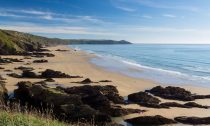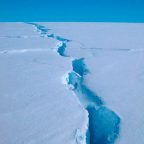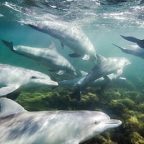
The UK government’s promise to protect Britain’s coastal waters has been called a “sham” by a leading ocean scientist. Professor Callum Roberts of York University told Sky News that Britain’s so-called marine protected areas (MPAs) are just “lines on a map” and do little to safeguard wildlife.
He said allowing continued commercial exploitation, such as fishing, drilling and dredging, is “no protection at all.”
Sky’s Ocean Rescue is working with WWF to safeguard marine conservation zones across Europe. Plastic pollution, climate change and over-fishing have put the ocean under unprecedented pressure.
Sky News will be closely following United Nations oceans campaigner Lewis Pugh as he swims the length of the English Channel to highlight the plight of the UK’s domestic waters.
There are almost 300 marine protected areas around the UK, amounting to 25% of inshore waters.
The government is currently consulting on another 41 conservation zones to complete what it calls a “blue belt” around the country.
But Professor Roberts said almost all the MPAs simply protect individual features on the sea bed.
“Rather than protecting a seahorse on a seagrass plain, you need to protect the ecosystem, from the bottom of the sea to the top,” he said.
“You can’t keep creating lines on a map without changing the situation for life inside them. If there is no change it is just a sham.”
Professor Roberts’ research has shown marine sanctuaries that ban trawling allow fish to grow bigger and more abundant.
Not only do the fish spill over into surrounding areas, sustaining the fishing industry, but their eggs drift on the current to increase fish stocks far and wide. The benefits can be seen in as little as five years.
Just three of the UK’s MPAs, however, are “no-take” zones.
Lundy Island off north Devon, Lamlash Bay on the Isle of Arran, and Flamborough Head in Yorkshire amount to just three square miles of protected sea. That’s 0.01% of the coastal water.
Professor Roberts said 30% of the UK’s sea within the 200-mile territorial limit should exclude extractive activity, including fishing.
“The seas have declined from over a century of exploitation,” he said.
“The sail-powered boats of the 1880s caught five times more fish than the trawlers of today. We have to create MPAs that bring back the fish.”
Lewis Pugh will shortly begin a 350-mile swim from Land’s End to Dover to campaign for 30% of UK sea to be given full protection.
Sky News took him to Lundy Island, Britain’s first marine refuge. Fishing has been banned on one side of the island since 2003.
Since then marine life has flourished and spread into surrounding areas.
“It is beautiful,” he said. “This area was protected just after I was born. Now we are seeing the benefits.
“It’s wonderful to swim here and see the puffins, guillemots, jellyfish and seals – all these animals living as they should. We need more areas protected like this.”
But launching the consultation on new MPAs, Environment Secretary Michael Gove said they protect endangered species.
“The UK is surrounded by some of the richest and most diverse sea life in the world. We must protect these precious habitats for future generations.”













Social Profiles